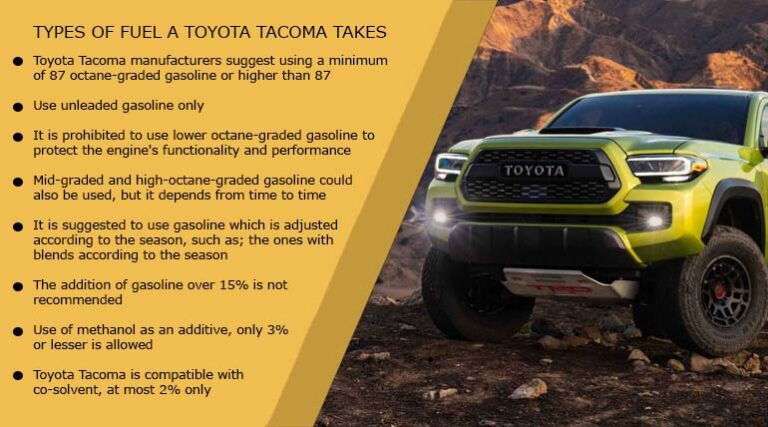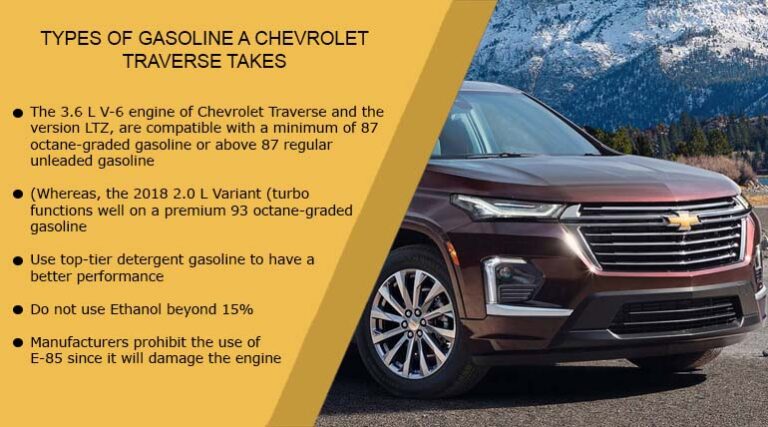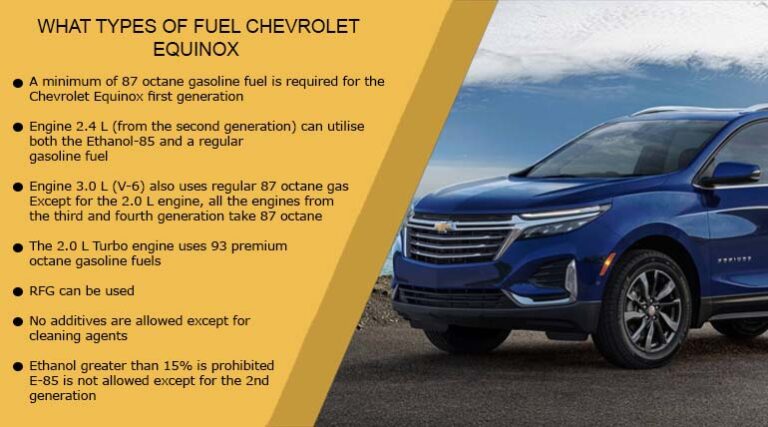Types of Gasoline Dodge Journey Requires to Function Well:
Types of gasoline a Dodge Journey requires to function properly will be discussed in this article. Moreover, fuel alternatives other than conventional gasoline and all the information regarding fuel tank sizes will also be addressed. Stay Tuned!
However, before moving further into the details, let’s look at the brief history of Dodge Journey.
Dodge Journey is a beautiful mid-sized crossover sports utility vehicle (SUV). It was produced by Fiat Chrysler Automobiles, which is a Dodge brand. The Journey has model years from 2009-2020, over one generation. It had its face-lift model in the year 2011.
A Brief Overview!
Here’s a brief overview of the types of gasoline a Dodge Journey requires before jumping into the explanation;
To summarize, the Dodge Journey model years 2008 to 2011, having a 2.4 L engine, requires an unleaded regular 87 Octane –graded gasoline. Engine versions, including the 3.5 L, need 89 Octane-graded gasoline to perform well. Dodge Journey, produced after 2011, requires unleaded regular 87 Octane –graded gasoline.
Types Of Gasoline Dodge Journey Requires (All Model Years)
We have provided all the crucial information you’re looking for regarding your Dodge Journey’s fuel type. All the data is gathered using Dodge Journey’s owner’s manuals. Fuel type is based on engine’s type. There are differences between gasoline-based engines and diesel-based engines. Let’s further dig in all about the Dodge Journey’s engines and the required fuel type.
Regular Unleaded Gasoline With 87 Octane-Rating
Dodge Journey’s all model years require a regular unleaded 87-Octane graded gasoline for optimal performance. Hence, Dodge Journey’s model years 2008 to 2011 with a 2.4 L engine requires an unleaded regular 87 Octane –graded gasoline. Engine versions, including the 3.5 L, need 89 Octane-graded gasoline to perform well. Dodge Journey produced after 2011 requires unleaded regular 87 Octane –graded gasoline. Similar gasoline types are used for Dodge Challenger and Dodge Durango.
Using a Higher-Octane Gasoline (Premium)
Do you know that the Dodge Journey is built in a way that it can’t function on very high-rated octane gasoline? Several owners must wonder if they can use premium gas on their journey. Because most of us perceive that using a higher-octane gasoline result in efficient engine performance.
Dodge does not recommend using gasoline higher than 91 Octane. No doubt, if it gets used, it will still function, but it does not cause any additional benefits. The main reason behind this is the manufacturing of the engines, which is different from a way that can utilize a premium gas.

Credits @majorworldchryslerdodgejeepram
Fuels Alternatives Other Than Conventional Gasoline
If not gasoline, which other fuel options can you use in your Dodge Journey for better performance? We have covered all about fuel alternatives other than conventional gasoline in this section, so Hang On!
Gasoline comprising Methylcyclopentadienyl Manganese Tricarbonyl (MMT)
Any manganese-based additive is not allowed by Dodge for its Dodge Journey. In fact, any vehicle in the world does not tolerate using it. Vehicle owners used this additive, but later, manufacturers stopped advising MMT-based gasoline.
Biodiesels
Biodiesel oils are very environmentally friendly. They are derived from cooking oil (wasted), vegetable, and soybean oils through a process called “Trans-esterification.” Dodge does not allow any diesel fuels for its Dodge Journey. This is because Dodge Journey has no diesel-based engines.
Reformulated Gasoline Fuel (RFG)
Fuel alternatives such as Reformulated Gasoline Fuel is an amazing and safest option for your Dodge Journey. RFGs have a very nature-friendly effect. Its usage causes less production of smog and toxins into the environment. Hence, Dodge allows Journey’s owners to utilize RFG.
Dodge Journey Owner’s Recommended Fuel Type
Dodge Journey’s all model years require a regular unleaded 87-Octane graded gasoline for optimal performance. Hence, Dodge Journey’s model years 2008 to 2011, having a 2.4 L engine, needed an unleaded regular 87 Octane –graded gasoline.
Engine versions, including the 3.5 L, need 89 Octane-graded gasoline to perform well. Dodge Journey produced after 2011 requires unleaded regular 87 Octane –graded gasoline. Moreover, manufacturers recommend using top-tier detergent gasoline for better engine performance.
Gasoline/Oxygenated Blends (Ethanol)
During winter weather, using oxygenated gasoline fuel is a good choice. Because such fuels help in starting a vehicle easily during cold conditions. These are mostly used in North America. But is Dodge Journey compatible with such blends? So the response to this question is a “Yes.” The only condition is using the required and limited percentage of such mixtures.
Manufacturers ask not to use methanol at all. Journey models produced between the years 2008 to 2014 can use up to 10% Ethanol (E-10). Whereas the Dodge Journey-2014 can use up to 15% Ethanol (E-15). Only the latest versions of Dodge Journey can use E-85, else it was not allowed in the old models.
Gas/Fuel With Added Cleaning Agents
Additives are usually added to a regular gas to increase the vehicle’s durability. But Dodge does not allow certain additives such as; metallic, manganese, and silicon-based for its Dodge Journey. The reason is the ability of such toxic additives to damage the engines and system inside. Moreover, manufacturers recommend using top-tier detergent gasoline for better engine performance.
Which Additives Are Not Allowed For The Dodge Journey?
Additives not allowed by Dodge Journey manufacturers include;
- SolventsMethanol
- Silicon
- Any metal-based ones
- Kerosene
- Additives based on metals
Dodge Journey Drivers’ Reviews Regarding Fuel Type
Considering the reviews of the Dodge Journey’s drivers, using unleaded regular 87 Octane–graded gasoline gives an adequate engine performance. Regarding the ethanol and gasoline blends, several drivers prefer using E-10 or E-15 over E-85 because E-85 is compatible only with flex-fuel vehicles. Otherwise, it lowers the economy of fuel.
Question & Answer Section!
What Does It Indicate If Your Dodge Journey’s Engine Produces Knocking Noise?
If you put a lower than 87 octane-rated gasoline in your Dodge Journey, it degrades the performance and economy of the engine. Gasoline will burn prematurely if one puts a lower-octane gas in a machine with higher compression. It causes an unsmooth burn and engine knock.
Hence, it is highly crucial to use the correct gasoline fuel with the right octane grading.
If you hear a fainted-knocking sound from your Dodge Journey engine, it indicates no danger. But if you hear a loud knocking sound from your Dodge Journey’s engine, it is due to the usage of a lower quality and lower octane gasoline.
What is the Importance of Using the Correct Type of Dodge Challenger?
However, now the query arises, why is it so important to know about the correct type of fuel for your Dodge Journey? The response to this is simple; to guard your engine against damage and accidents of fire and to keep your warranty away from being void.
How Can I Reduce “Knocking Noise” from My Dodge Challenger Engine?
To reduce the knocking-like noise in your Dodge Journey, fill up your tank with a recommended minimum of 87 Octane-graded gasoline or a mid-graded 91-octane gasoline or greater. Use at most 87 octane-graded gasoline.
What Are The Consequences Of Using The Wrong Fuel Type?
When the wrong fuel type is used, it results in the following consequences;
- Low engine performance
- Knocking of engine
- Severe damage to the interior of the engine
- Poor fuel-economy
What Is the Size Of the Fuel-Tank Per Model Year Of The Dodge Journey?
- Dodge Journeys with Front Wheel Drive (FWD) and a 2.4 L PZEV engine from 2008 to 2011 had a gasoline tank capacity of 18.5 gallons (70 liters).
- Journeys with Front Wheel Drive (FWD) and a 2.4 L PZEV or 3.5 L engine have a fuel tank capacity of 20.5 gallons (77.6 liters).
- The gasoline tank in all-wheel drive (AWD) variants is 21 gallons (79.8 liters).
- Dodge Journey Front Wheel Drive vehicles from 2011 to the present have a gasoline tank capacity of 20.5 gallons (77.6 liters), while AWD models have 21 gallons (79.8 liters).
Can All the Generations of Dodge Journey Consume RFGs as Fuel?
You must be pondering if all generations of Dodge Journey are suitable for using Reformulation Gasoline Fuel, so the answer to this is YES!
Dodge Journey can utilize RFGs, as a fuel option whenever it is available since it has also been compulsory for almost nineteen states and regions in the United States of America to use less toxic fuel to protect the quality of air.
How to Locate a Flex-Fuel Vehicle?
Following are the ways to locate a flex-fuel engine in your vehicle;
A yellow bezel surrounding the inlet of the fuel tank indicates that your vehicle is flex-fuel. If you are unable to find it there, then you can check out the door of your fuel tank as well.
However, Dodge Journey manufacturers do not allow it to run the engine on an E-85, even if it is flex-fuel.
Conclusion
To conclude, Dodge Journey has model years from 2009-2020, over one generation. It had its face-lift model in the year 2011. Dodge Journeys all the model years require a regular unleaded 87-Octane graded gasoline for optimal performance.
Hence, about the types of gasoline Dodge Journey model years 2008 to 2011 with a 2.4 L engine requires an unleaded regular 87 Octane –graded gasoline.
Engine versions, including the 3.5 L, need 89 Octane-graded gasoline to perform well. Dodge Journey produced after 2011 requires unleaded regular 87 Octane –graded gasoline.
Dodge does not recommend using gasoline higher than 91 Octane. No doubt, if it gets used, it will still function, but it does not cause any additional benefits. The main reason behind this is the manufacturing of the engines, which is different from a way that can utilize a premium gas.






